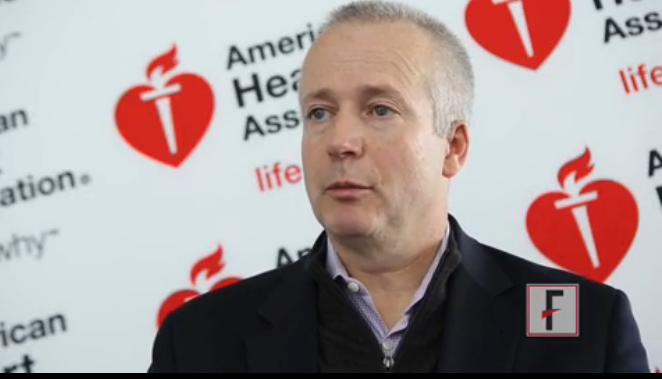User login
CHICAGO – Two new types of drug-eluting, biodegradable polymer stents weren’t inferior to current drug-eluting stents, and they possibly may have caused fewer stent thrombosis episodes.
But do the new stents reduce the risk of long-term stent thrombosis? How will their ease of use affect choice of stents? And how should long-term coronary events that aren’t related to the stents themselves shape approaches to secondary prevention?
In an interview at the American Heart Association scientific sessions, Dr. Robert Harrington shared his perspectives on these questions and connected the stent studies’ results with new findings in prevention research.
The two studies of the new stents were not large enough, nor were patients followed long enough, to prove an advantage in stent thrombosis rates in a definitive way. But the lead investigator in the everolimus-eluting Synergy stent study described the stent as more flexible and deliverable than current coronary stents.
Those usability features may make that stent an attractive option for interventional cardiologists even if clinical outcomes are not significantly improved, Dr. Harrington noted.
“These technical features, such as improved deliverability, are things that will resonate with the interventional community,” he said. “It offers another option for complex cases, and that appeals greatly to interventional cardiologists who are looking for technical solutions,” said Dr. Harrington, professor and chairman of medicine at Stanford (Calif.) University.
Dr. Harrington said that he had no disclosures regarding the studied stents, but he has received grants from several drug companies that market drugs used during and after patients undergo percutaneous coronary interventions.
On Twitter @mitchelzoler
The video associated with this article is no longer available on this site. Please view all of our videos on the MDedge YouTube channel
CHICAGO – Two new types of drug-eluting, biodegradable polymer stents weren’t inferior to current drug-eluting stents, and they possibly may have caused fewer stent thrombosis episodes.
But do the new stents reduce the risk of long-term stent thrombosis? How will their ease of use affect choice of stents? And how should long-term coronary events that aren’t related to the stents themselves shape approaches to secondary prevention?
In an interview at the American Heart Association scientific sessions, Dr. Robert Harrington shared his perspectives on these questions and connected the stent studies’ results with new findings in prevention research.
The two studies of the new stents were not large enough, nor were patients followed long enough, to prove an advantage in stent thrombosis rates in a definitive way. But the lead investigator in the everolimus-eluting Synergy stent study described the stent as more flexible and deliverable than current coronary stents.
Those usability features may make that stent an attractive option for interventional cardiologists even if clinical outcomes are not significantly improved, Dr. Harrington noted.
“These technical features, such as improved deliverability, are things that will resonate with the interventional community,” he said. “It offers another option for complex cases, and that appeals greatly to interventional cardiologists who are looking for technical solutions,” said Dr. Harrington, professor and chairman of medicine at Stanford (Calif.) University.
Dr. Harrington said that he had no disclosures regarding the studied stents, but he has received grants from several drug companies that market drugs used during and after patients undergo percutaneous coronary interventions.
On Twitter @mitchelzoler
The video associated with this article is no longer available on this site. Please view all of our videos on the MDedge YouTube channel
CHICAGO – Two new types of drug-eluting, biodegradable polymer stents weren’t inferior to current drug-eluting stents, and they possibly may have caused fewer stent thrombosis episodes.
But do the new stents reduce the risk of long-term stent thrombosis? How will their ease of use affect choice of stents? And how should long-term coronary events that aren’t related to the stents themselves shape approaches to secondary prevention?
In an interview at the American Heart Association scientific sessions, Dr. Robert Harrington shared his perspectives on these questions and connected the stent studies’ results with new findings in prevention research.
The two studies of the new stents were not large enough, nor were patients followed long enough, to prove an advantage in stent thrombosis rates in a definitive way. But the lead investigator in the everolimus-eluting Synergy stent study described the stent as more flexible and deliverable than current coronary stents.
Those usability features may make that stent an attractive option for interventional cardiologists even if clinical outcomes are not significantly improved, Dr. Harrington noted.
“These technical features, such as improved deliverability, are things that will resonate with the interventional community,” he said. “It offers another option for complex cases, and that appeals greatly to interventional cardiologists who are looking for technical solutions,” said Dr. Harrington, professor and chairman of medicine at Stanford (Calif.) University.
Dr. Harrington said that he had no disclosures regarding the studied stents, but he has received grants from several drug companies that market drugs used during and after patients undergo percutaneous coronary interventions.
On Twitter @mitchelzoler
The video associated with this article is no longer available on this site. Please view all of our videos on the MDedge YouTube channel
EXPERT ANALYSIS FROM THE AHA SCIENTIFIC SESSIONS
